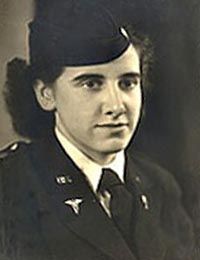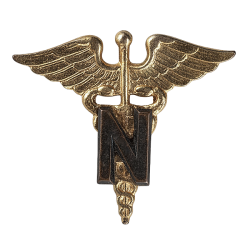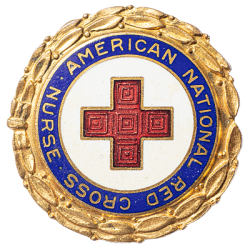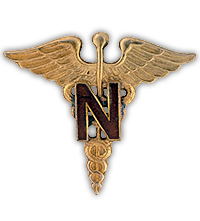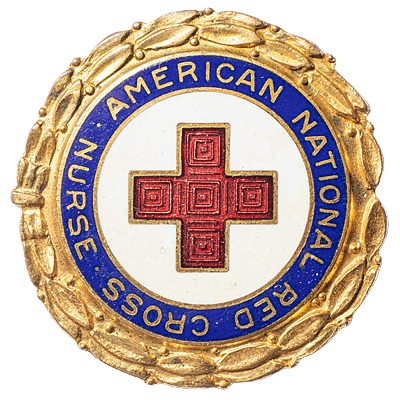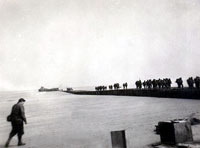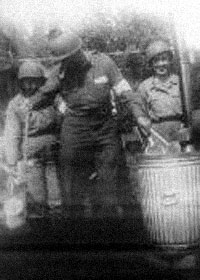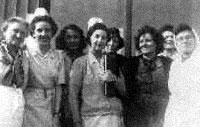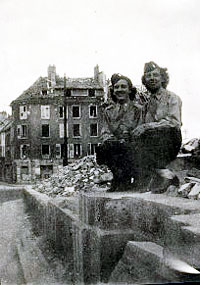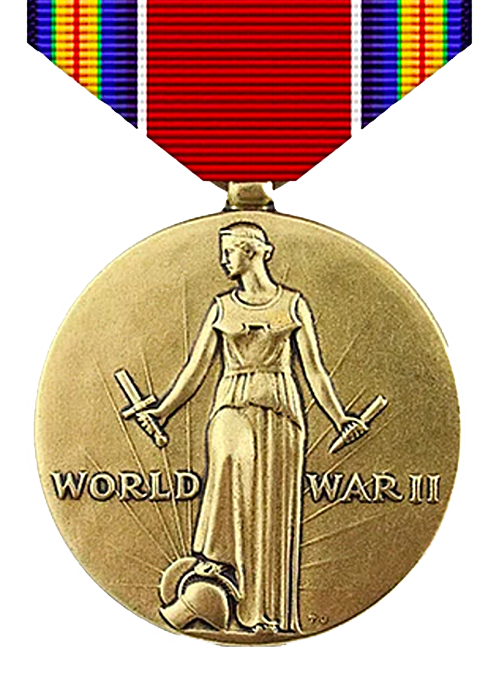I was born in New York on October 4th, 1921. I graduated from St. Vincent's Hospital School of Nursing in September of 1942 at the time when World War II was going on fully. There was a huge billboard, saying "We need you!" with a nurse at one end and these men from each part of the service at the other end of the sign. So with about 8 credits to go for my nursing degree, I left Columbia University. It was almost crazy, what I did. I felt the pull and the need to just serve. I was very idealistic about it, that I would go and serve my country and take care of all these young men who were more or less my age. So I enlisted.
In January of 1944, we went by boat to Scotland and spent a couple of nights in Glasgow. We then opened a hospital in Cheltenham, in the Cotswold Hills. They were looking for a volunteer for psychiatric nurse. No one wanted to do it. I did it and had a crash course. I had a 100-bed psychiatric bed unit, I was second-in-charge. At that point, we were receiving patients from Italy, and some from the Air Force. They were flown out of Anzio and places like that. And we also had British soldiers and people with what we called combat exhaustion, now it's called post-traumatic syndrome.
I remember my first trip into London, I remember going to the area around St. Paul's Cathedral. Although I had been seeing wounded coming in, I hadn't yet seen the devastation. So when I saw it, I was truly sickened. It was just beyond anything I could have imagined. Just total devastation...horrible. And the people of London were living in the subways. They went to work in the daytime and went to bed in the subways. Then the experience of walking to the Cathedral. I didn't realize it had been bombed. We walked in and there was a big hole in the ceiling near the altar. I remember I was crying. It was just beyond what I could imagine. Yet for some reason, I felt I had such a sense of the presence of God, sitting in that church.
The night of D-Day came. I remember that night, the fifth of June. What I remember is we started hearing the sound of airplanes. The first thing, as I recall, was seeing planes pulling the gliders. From darkness, the entire night and half the next day, the sky was constantly filled with planes for the invasion, constantly. On June 7, I was sent somewhere in England temporarily detached from my own outfit. I had a 30-bed surgical ward, 27 of my patients were critically ill, and these were all men who had been carried back from the invasion right away. In other words, these were men who had been wounded on June 6 and 7. And they were severely wounded, fingers, arms blown off, I remember a man whose buttocks were blown off...stomach wounds, severe, severe wounds, 19 and 20 years old, younger than I. That stands out to me as one almost constant nightmare. Constantly fighting death...
I remember in particular one young man, I thought I would remember his name because I wrote to his parents but I can't. He had been in a tank and had been burned all over. All but his face and the top of his head and the palms of his hands were burned, the backs of his hands were burned but not his fingers. Not only was he burned, but he had lain there before he was picked up so he was covered with maggots. He would tell me, "I feel I can stand the pain of the burns but the crawling maggots are driving me almost insane." We tried everything surgically, the doctors and the sergeant and myself, we immersed him in warm, sterile, saline solution, to kill the maggots. We never got them all. We got a lot of them that time. The boy was from Texas and he was 19 years old, I remember that. And there was one tall young black man who came and read from the Bible to him. They would talk about God together, this white Texan and the black Southern soldier. I had the Miraculous Medal and I asked him if I could put it on his finger. I so wanted him to live. He whispered to me "Don't worry, don't worry, I am ready to go. And when I die, I want you to write to my parents and tell them I was prepared and I knew I would see God." So I did.
That's what I remember. Working and sleeping. If I went to eat, I ate in a hurry and rushed back. It was an intense experience. And we were running out of bandages. Years and years later, I had nightmares about it. In 1955 in the Mt. Kisco Cenacle, the sheets for the retreatants were rented. The nightmare that I had was, I had all these critically ill patients again, one bandage, and they wouldn't let me use those sheets because they were rented. This is eleven years later, I had those nightmares 2 or 3 nights in a row. It provoked something in me that was still there. The feeling "How are we going to do this? How are we going to take care of all these men? Where are we going to get the bandages?"
Then I got orders to move and I packed up, kissed the sergeant goodbye and that was it, back to my own unit. We were now going to France! With all the dedication of youth, you just felt you were doing a great thing to go across and be there. I felt that. We certainly all felt like that. It was why we had come and why we were doing it.
So then we landed. I believe it was Utah Beach. And then we moved to near Carentan. Our first few nights were terrible. We had to dig some trenches for latrines. We set up temporarily there. But the circumstances were terrible. See, that's what I remember. I remember, in my hospital, we could not understand why the Americans came back and leveled St. Lo. We had not seen that many Germans. It was beyond my comprehension and it made me have a whole different feeling about the war. I began to think, everybody is crazy, the whole thing is crazy. So all the sense of coming and doing something noble was drained out of me. I knew that caring for the sick was a good thing. But as far as serving my country, I had the feeling that every country was crazy. Crazy to try to solve everything this way. And yet, the worst horror was the realization that the things Hitler had done were so terrible and way back ought to have been resisted.
What I remember of that hospital experience is the smell of death, rotting dead bodies everywhere. At that point, we received civilians. They had no other place to go. That's where, in the heat of the summer sun, I collapsed. I was overnight at another hospital in a ward where there were men, women and children. I can still see those women with the severe injuries of war and their families. There was no place to go. I mean it was such a jungle and they were taking care of them all. That's how I recollect it. What I also remember is children going through our garbage, looking for food, they were going through the garbage...
Four days before the surrender of Paris, we were packed up, put on a train and moved to Paris. I remember being on that train, having nothing to eat, being given potatoes and fruit. But I also remember that they gave the soldiers Calvados. So the next thing, you know, in addition to being hungry, we had to take care of horribly sick enlisted men, vomiting blood from drinking so much Calvados. So that was part of the trip to Paris. And then, going into Paris, I have only one picture of that. It is a picture of a tank that I must have taken. The soldiers are bending down in friendship to some of the civilians. But my own remembrance of it is having men, women and children kissing me. I was kissed all day long! Elizabeth and her cousin Roger, a paratrooper, in a reunion near Paris.
Later I was again on detached service up near Rheims and I again had a psychiatric ward. What I remember is the terrible, in many senses, the terrible "brew" of patients. A visiting psychiatrist came by and he was making the rounds of all of our wards. On the second floor, I can still see it now, he said "What's the matter, what's making you so sad, what's the dreary looks on you?!" I kept to myself so well and I was so angry with him. I thought, what a way to talk. And a guy stood up and said, "Sir, isn't it strange, doesn't it strike you as very very strange, that if a person can get used to seeing their friends get blown to pieces they're normal. And if you can't get used to it, you're not normal. Don't you think that's strange?" The colonel never answered that but I held it in my mind. And of course, that was the beginning of my real radical sense that someone has to cry halt.
Towards the end of the war, Americans who had been prisoners of the Germans came into my ward. These were men who were on the edge of starvation. The first few days, they just had cream of wheat with water, sugar and salt and they were on intravenous. We put sugar and salt in water to try to get them to eat it but they hated it so then we did the gruel. They could tolerate the gruel. See, we needed to get the sugar and salt into them. We couldn't keep them on this forever so we fed them the cream of wheat. And gradually, we would add a little powdered milk at a time and a little margarine. Then we restored them to health. They went back to their outfits.
During the time between the end of the European war and the end of the whole war, I had a week's leave and decided to go to England and make a retreat. I had read about retreats in a magazine which the chaplain had. I took a boat across the English Channel, saw the White Cliffs of Dover, and all around there it was devastation. I took a train to London and I asked a priest there if he ever heard of retreats. He laughed! He said "Go to the Cenacle." So I found my way to Grayshott and made the five-day retreat. I talked with nobody and I wrote my mother 6-page letters.
I came back to the States in December of 1945 and I came into Boston Harbor. I remember coming home. I worked my way home. There was a terrible storm at sea and they asked me to work the sick bay. If you worked for the Navy, you would get three meals. So I volunteered instantly!
I came home thinking I had a religious vocation. I was dating a couple of guys and I worked at New Rochelle Hospital. I was working a 40-hour week. It seemed to me then that God said to me --"Don't worry. I have something else in mind for you. I really want you to be a Sister." I did not know where I wanted to enter. So my mother said to me one day "I think you're just wasting your time. Not that I want to get rid of you but if you're going to do it, start thinking about which Order! Do it or don't do it! One way or the other. Why don't you try the Cenacle?" I said "Oh, yes, that's right." I got on the train to New York City. So I went to the Cenacle and Sr. Ignatius greeted me and I said to her: "Who would I talk to about entering the novititiate?” So I applied and entered...50 years ago this year.
After I came to this decision that the U.S. wasn't all good and they weren't all bad, that there was evil on every side, I knew and felt that my care of the sick was still an important thing to do. These were young men who hardly knew why they were there except to fight for their country. They were idealists. Some of them were drafted. And I had some medics who were conscientious observers who would not do anything except medical work. Even after that, I knew, I felt, I was doing something good. I felt that the care of these young people was so meaningful, very worth doing, and I felt very dedicated. I certainly felt myself totally dedicated the whole time I was there. And gradually, a seed was planted in the back of my mind.
I often thought about how important it is to resist the beginnings of evil. And to recognize the beginnings of injustice, and how important it is to love your neighbor as yourself. How important it is to care what's happening to the people around you, all the time. And to name what's unjust, name it, look at it and name it. Call it what it is What I often thought about is how important it is to resist the beginnings of evil. And to recognize the beginnings of injustice, and how important it is to love your neighbor as yourself….all the time.
Sr. Elizabeth
